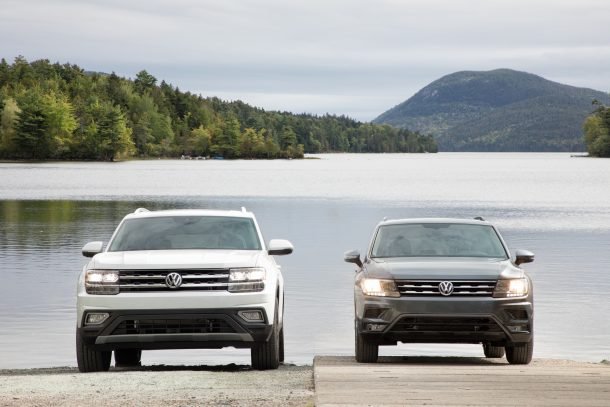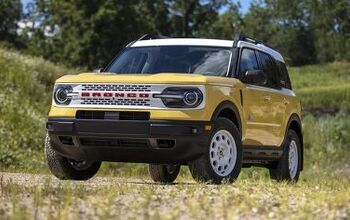Volkswagen's Short-term Crossover Plan: Get Asses In Seats By Removing Seats

The first salvo in Volkswagen’s battle to win the hearts and cash of the American populace arrived in the form of two crossovers: the new full-size Atlas and the vastly updated (and enlarged) second-generation Tiguan.
Both models sport three rows of seating, a key strategy for expanding the brand’s sales volume and appeal. Phase Two of the company’s U.S. campaign, however, involves ripping those seats out.
Speaking to Automotive News, Hinrich Woebcken, CEO of Volkswagen’s North American region, said the company plans to offer two-row versions of both models. By splitting both models into two flavors, the automaker hopes to spread a larger sales net in both segments.
“We decided the Atlas will get a slightly lower-positioned five-seater, with nice, coupe-ish styling, [but the] same dimensions,” Woebcken said. Diversifying the Atlas range is something the automaker’s chief technology officer, Matthias Erb, hinted at last year.
The new Tiguan, sporting a wheelbase nearly 11 inches longer than its predecessor, is the long-wheelbase “Allspace” version sold in Europe alongside a shorter twin. Below it, the first-gen Tiguan remains on the company’s U.S. roster as a lower-priced entry-level model. With those rearmost seats gone, expect the larger model to “get kind of a little smaller,” Woebcken claims.
Yes, we’re talking about three Tiguans, though it’s possible the old Tiguan Limited will be a thing of the past by the time the two-row revolution hits. VW tossed an eight-speed automatic into the Limited’s toolkit for 2018 in a bid to keep the model somewhat fresh.
Though Woebcken couldn’t say when exactly we’ll see either the two-row Atlas or slightly smaller Tiguan, earlier this year he claimed 2019 would, like 2017, be an SUV-focused year. A 2020 model, perhaps? The emergence of the two-row Tiguan as a future model potentially sheds light on an earlier claim that the company has a “better idea than the [overseas-only T-Roc] for North America.” Has the automaker decided a new standalone compact model just isn’t worth it in the American market?
Improving U.S. profitability is the company’s top goal, so such a move would make sense. Atlas sales rose to a new monthly high in November, while Tiguan sales, bolstered by the choice of two body sizes, reached a record 6,947 units last month. The model’s on track for its best sales year to date in 2017.
[Images: Volkswagen]

More by Steph Willems
Latest Car Reviews
Read moreLatest Product Reviews
Read moreRecent Comments
- B-BodyBuick84 Not afraid of AV's as I highly doubt they will ever be %100 viable for our roads. Stop-and-go downtown city or rush hour highway traffic? I can see that, but otherwise there's simply too many variables. Bad weather conditions, faded road lines or markings, reflective surfaces with glare, etc. There's also the issue of cultural norms. About a decade ago there was actually an online test called 'The Morality Machine' one could do online where you were in control of an AV and choose what action to take when a crash was inevitable. I think something like 2.5 million people across the world participated? For example, do you hit and most likely kill the elderly couple strolling across the crosswalk or crash the vehicle into a cement barrier and almost certainly cause the death of the vehicle occupants? What if it's a parent and child? In N. America 98% of people choose to hit the elderly couple and save themselves while in Asia, the exact opposite happened where 98% choose to hit the parent and child. Why? Cultural differences. Asia puts a lot of emphasis on respecting their elderly while N. America has a culture of 'save/ protect the children'. Are these AV's going to respect that culture? Is a VW Jetta or Buick Envision AV going to have different programming depending on whether it's sold in Canada or Taiwan? how's that going to effect legislation and legal battles when a crash inevitibly does happen? These are the true barriers to mass AV adoption, and in the 10 years since that test came out, there has been zero answers or progress on this matter. So no, I'm not afraid of AV's simply because with the exception of a few specific situations, most avenues are going to prove to be a dead-end for automakers.
- Mike Bradley Autonomous cars were developed in Silicon Valley. For new products there, the standard business plan is to put a barely-functioning product on the market right away and wait for the early-adopter customers to find the flaws. That's exactly what's happened. Detroit's plan is pretty much the opposite, but Detroit isn't developing this product. That's why dealers, for instance, haven't been trained in the cars.
- Dartman https://apnews.com/article/artificial-intelligence-fighter-jets-air-force-6a1100c96a73ca9b7f41cbd6a2753fdaAutonomous/Ai is here now. The question is implementation and acceptance.
- FreedMike If Dodge were smart - and I don't think they are - they'd spend their money refreshing and reworking the Durango (which I think is entering model year 3,221), versus going down the same "stuff 'em full of motor and give 'em cool new paint options" path. That's the approach they used with the Charger and Challenger, and both those models are dead. The Durango is still a strong product in a strong market; why not keep it fresher?
- Bill Wade I was driving a new Subaru a few weeks ago on I-10 near Tucson and it suddenly decided to slam on the brakes from a tumbleweed blowing across the highway. I just about had a heart attack while it nearly threw my mom through the windshield and dumped our grocery bags all over the place. It seems like a bad idea to me, the tech isn't ready.


































Comments
Join the conversation
There already is a 2-seat version of the new, extended-length Tiguan, as long as you buy one with AWD. For reasons unclear to me, the (uselessly tiny) 3rd row seat is mandatory on FWD models. It now only steals luggage space when folded down compared to a two-row new Tiguan, but also stops the second row seat from sliding as far back.
If I were VW, I would quickly issue a cease and desist on that title picture. Is VW trying to evoke the spirit of the 80s in these homely designs? Absolutely awful!